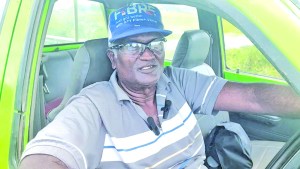
As farmers in East Berbice prepare for the next rice crop, access to irrigation water has become a sore issue. Even though the Region Six Administration has nine pumps working to take water from the Canje River, rice farmers in Black Bush Polder and communities considered ‘front lands’ along the Corentyne Coast are not getting any fresh water.
Many of the canals are almost dried up. Farmers say the canals should be overflowing to allow them to pump water into their rice fields and sow paddy for the next crop. They are just out of the second crop of 2024, and are preparing for the first crop of 2025.

For the second crop of 2024, between 65,000 and 70,000 acres were harvested, and farmers raked in between 40 and 45 bags per acre. As part of the preparations for the first crop of 2025, irrigation pumps have recently been put into operation to facilitate farmers with water.
According to Region Six Chairman David Armogan, six pumps are currently in operation in the Black Bush Polder community, and a further three are at Manarabisi. “Once those pumps keep (on being) operational, we should be able to get sufficient irrigation water to supply all of the farmers within the Black Bush Polder, the front lands as well as the Manarabisi area and the Crabwood Creek area,” he told this publication. However, Black Bush Polder farmers have expressed concern over the insufficiency of water in the irrigation canals.

Bicham Sookdeo, a 65-year-old rice farmer of Mibicuri South, who cultivates thirty acres with rice, says there is an urgent need for water.
“Right now, it is water we are waiting on; we need water to start. I already prepared the land, and now I am waiting on water to finish the land preparation,” he said.
Tamash Sookhai, another rice farmer who cultivates fifty acres in the same area, has said he has already sowed his paddy. “We have a shortage of water. We don’t have enough water, so we haven’t finished working yet,” he said.
Regional Chairman Armagon has pointed out that while the pumps have been working for the past two weeks, water has not reached most areas as yet. “The problem is that, right now in the Cookrite Savannah, there are between 6000 and 7000 acres of rice under cultivation. So, as the water is being pumped from the Black Bush Polder end, these farmers have tubes and are taking the water into the Cookrite Savannah,” he explained.
According to Armogan, during a visit to the area on Wednesday, he was told that the farmers at Cookrite Savannah now have enough water to commence their crop.
“So we expect that a lot of water will now be diverted into the Black Bush Polder area. Once the water is being diverted there, you would find that the farmers in the Black Bush Polder will have sufficient water to start their crop,” he clarified.
Further, he explained that when the water level in Black Bush Polder has reached a high, the water would be regulated so that those in the front lands would start getting water.
“Because cash crops are also very important, and so water will be diverted into the front-land areas so that we can have both rice and cash crops having sufficient water to grow,” Chairman Armogan pointed out. (G4)
Discover more from Guyana Times
Subscribe to get the latest posts sent to your email.









